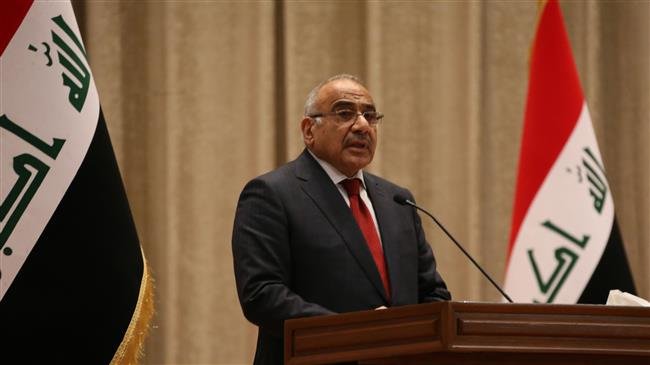
RNA - "We want to secure Iraq from any interference in issues, affairs of other countries, whether it's a neighboring country or it's any other country in the world," Abdul-Mahdi told a news conference in the capital Thursday.
Baghdad had earlier called US sanctions on Iran "wrong and unacceptable", pledging that it would never accept the “cruel” measures. Former Iraqi premier Haider al-Abadi had initially said that his government would only respect the dollar ban in transactions with Iran.
Abadi later called the sanctions “unilateral” and “oppressive”, saying that Iraq would not be “part of a blockade” due to its own painful experience with international sanctions during the era of Saddam Hussein.
Iraqi officials also declared that they would ask Washington for waivers on Iran sanctions which could hit crucial supplies.
Iran is a source of assorted goods ranging from food and agricultural products to home appliances and spare car parts to the neighboring Arab nation, with annual trade standing at more than $12 billion.
The Islamic Republic is pushing forth with a 2025 vision plan to raise its exports to Iraq to $20 billion a year despite US pressures on Baghdad to keep Tehran at its arm’s length.
A few weeks ago, Iran’s business adviser at the country’s embassy in Baghdad was quoted as saying that the Islamic Republic was already ahead of its plan, with non-oil exports currently standing at $4.5 billion.
“Based on the average growth rate of 8.5% of non-oil exports and the realization of about $4.5 billion worth of these exports, we can say that we are 28% ahead of our export targets to Iraq,” Nasser Behzad said.
According to Press TV, Iran is currently Iraq's top trade partner, with annual turnover of about $12 billion, according to Iraqi officials. By comparison, annual trade between Saudi Arabia and Iraq stands below $6 billion.
Foodstuff, livestock, construction material and plastic products constitute the bulk of Iran’s exports to Iraq. Iranian vehicles and food data-x-items are a ubiquitous sight in Iraq.
Iraq is also the biggest importer of electricity from Iran. The country was hit by a series of protests amid electricity shortages this summer.
Iraq eyes enhanced relations with Iran: FM
Iraq’s new foreign minister, Mohamed Ali al-Hakim, told his Iranian counterpart Mohammad Javad Zarif on Thursday that Baghdad seeks to further strengthen its good and longstanding relations with Tehran.
In a phone conversation, the Iraqi top diplomat also gave assurances that Iranian pilgrims currently visiting the Arab country will be provided with necessary services during their stay in the holy cities of Najaf and Karbala.
Hundreds of thousands of Iranians, along with millions of others from across the world, are flocking to Iraq to mark Arba’een, the 40th day after the martyrdom anniversary of Imam Hussein, the third Shia Imam.
During the phone call, Zarif described Arba’een as the symbol of greatness of and respect for Ahl al-Bayt, or the Household of Prophet Muhammad (Peace be upon Him), and unity between the two neighboring countries.
He thanked the Iraqi government and nation for their warm hospitality towards Iranian pilgrims, and called on the Iraqi government to facilitate their visit.
Zarif also congratulated al-Hakim on his new post and wished him success.
847/940